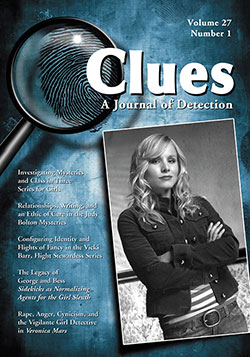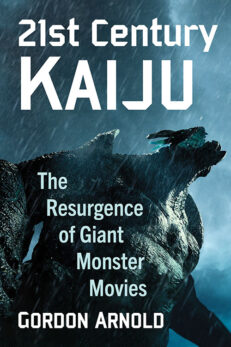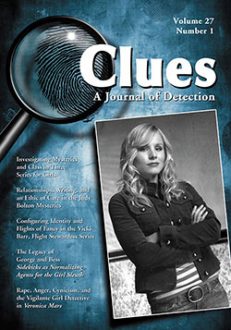Clues: A Journal of Detection, Vol. 27, No. 1 (Spring 2009)
Print Back Issue$30.00
In stock
About the Book
BACK ISSUE
This is a single back issue only. To order a current subscription, or for more information, please visit the journal’s web page at CluesJournal.com. Back issues from earlier volumes of Clues are available for order subject to availability. Also, single issues of the current volume may be ordered one at a time. Individuals may order back issues directly from our online catalog, and the charge for individuals is $30 (excluding postage). Issues from Volume 33 to the present are also available in ebook format on Kindle, Nook and Google Play.
The charge for single issues for institutions is $75 per issue (excluding postage). If your institution requires a back issue, please contact us to order at the appropriate rate.
About the Author(s)
Bibliographic Details
Executive Editor Margaret Kinsman
Managing Editor Elizabeth Foxwell
Format: softcover (7 x 10), back issue
Pages: 126
Bibliographic Info:
Copyright Date: 2009
ISSN 0742-4248
Imprint: McFarland
Table of Contents
Theme Issue : The Girl Sleuth
Guest Editor: Leona W. Fisher
Introduction
LEONA W. FISHER 5
The Accidental Sleuth: Investigating Mysteries and Class in Three Series for Girls
RAMONA CAPONEGRO 11
Although their publication dates span more than a century, three popular series
in which wealthy female protagonists accidentally become sleuths feature
representations of social classes, social reform, and charity that remain elitist,
stagnant, and often self-serving: the Witch Winnie series (1889–98), the Aunt
Jane’s Nieces series (1906–18), and the Samantha mysteries (2005–06).
“Use Your Head, Judy Girl”: Relationships, Writing, and an Ethic of Care
in the Judy Bolton Mysteries
MARY JEANETTE MORAN 22
In the Judy Bolton mystery series, relationships primarily serve as a source of
strength but still evoke a threat to women’s selfhood. Judy escapes this threat by
enacting a feminist ethic of care that uses the writing process to simultaneously
meet her own needs and the needs of others.
Configuring Identity and Flights of Fancy in the Vicki Barr, Flight
Stewardess Series
MICHAEL G. CORNELIUS 33
Identity in the Vicki Barr books is based on the three roles Vicki adopts in the
series: as girl, as stewardess, and as detective. An advancement of Lacan’s split-subject
theory demonstrates that when one aspect of Vicki’s trifigured identity
wavers, her entire subjectivity collapses.
Trixie Belden, Edgar Allan Poe, and the Secret of the Secret in Girl-Sleuth
Literature
STEVEN J. ZANI 49
The poststructuralist nature of “mystery” in the Trixie Belden series of girl-sleuth
novels is traced, with particular focus on The Black Jacket Mystery. Poe’s short
story “The Purloined Letter” and its criticism are touchstones for understanding
how girl-sleuth literature in general, and the Trixie Belden series in particular,
function for readers.
The Legacy of George and Bess: Sidekicks as Normalizing Agents for
the Girl Sleuth
JULIE D. O’REILLY 61
Sidekicks normalize their otherwise atypical protagonists, centering these girl
sleuths in a position of acceptable femininity. When compared to sidekicks, the
girl sleuth appears “normal”—a convention beginning with Carolyn Keene’s
Nancy Drew and companions George and Bess and continuing with Janet
Evanovich’s Stephanie Plum and cohorts Grandma Mazur and Lula.
“You Get Tough. You Get Even”: Rape, Anger, Cynicism, and the Vigilante
Girl Detective in Veronica Mars
ALAINE MARTAUS 74
Drawing from traditions of the teen girl sleuth, the detective of film noir, and
contemporary novels of the empowered female detective, the television series
Veronica Mars uses rape as a central theme to create a new kind of girl
detective—a cynical, wisecracking adolescent heroine.
ESSAY
Race, Identity, and Genre in Sujata Massey’s Rei Shimura Series
JENNIFER P. NESBITT 87
In Sujata Massey’s Rei Shimura series, the heroine performs her internalization
of essentialist notions of race even though the series is explicitly antiracist and
anti–Orientalist. Massey’s first and seventh novels bookend the series’ struggle
with this paradox, and subsequent volumes illustrate the conflict its resolution
creates with the demands of the genre-fiction market.
REVIEW ESSAY
“The Unknown—with a capital U!” Richard Marsh and Victorian Popular Fiction
CHRISTOPHER PITTARD 99
BOOK REVIEWS
Anne Humpherys and Louis James, eds. G. W. M. Reynolds: Nineteenth-Century Fiction, Politics, and the Press. STEPHEN KNIGHT 105
Kate Summerscale. The Suspicions of Mr. Whicher or The Murder at Road Hill House. JANICE M. ALLAN 107
Mary Elizabeth Braddon and Laurence Talairach-Vielmas, ed. Thou Art the Man. LINDA SCHLOSSBERG 109
LeRoy Lad Panek and Mary M. Bendel-Simso, eds. Early American Detective Stories: An Anthology. LINDA SCHLOSSBERG 109
Michael G. Cornelius and Melanie E. Gregg, eds. Nancy Drew and Her Sister Sleuths and Mark Connelly. The Hardy Boys Mysteries, 1927–1979: A Cultural and Literary History. GENIE GIAIMO 110
Philippa Gates. Detecting Men: Masculinity and the Hollywood Detective Film. MANINA JONES 112
Alexander N. Howe. It Didn’t Mean Anything: A Psychoanalytic Reading of American Detective Fiction. PAMELA BEDORE 115
Mary Hadley and Sarah D. Fogle, eds. Minette Walters and the Meaning of Justice: Essays on the Crime Novels. MARTYN COLEBROOK 117
Book Reviews & Awards
- “Clues is a must-have for readers and writers of crime fiction. Scholarly, thought-provoking, wide-ranging in its topics, Clues covers the crime and thriller map.”—Sara Paretsky
- “A. Conan Doyle, notoriously resentful of Sherlock Holmes’s success, liked to scorn ‘police romances’ as less significant and worthy of his talents than his other literary work. If he could have read Clues, the thinking mystery reader’s journal, he would surely have felt differently—and learned much he never realized himself about even his own landmark contribution to the genre, from which so much else by others has flowed.”—Jon Lellenberg, U.S. agent for the Arthur Conan Doyle estate
- “I love reading Clues. Every issue provides thought-provoking, well-researched articles. The variety and scope of the material found in Clues makes an unparalleled, ongoing contribution to our understanding of the role of crime fiction in our culture, and the genre’s reflection of its time and society.”—Jan Burke, Edgar-winning author of The Messenger (2009)
- “Clues is an important journal. It carries the torch of tradition that is the backbone of detective fiction. It goes below the surface and gets to the heart of what makes the genre so fascinating and valid today”—Michael Connelly, author of the Harry Bosch novels, including The Overlook (2007)
- “for erudite and fascinating truths about mysteries, follow the clues to Clues, the scholarly journal that is an essential resource for every serious student of the mystery”—Carolyn Hart, author of Death Walked In (2008)
- “with scholarship ranging from Poe to Peters, nothing beats Clues”—Joan Hess, author of Mummy Dearest (2008).





